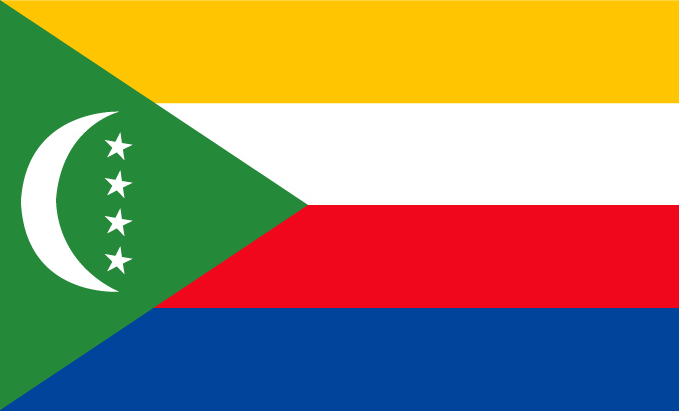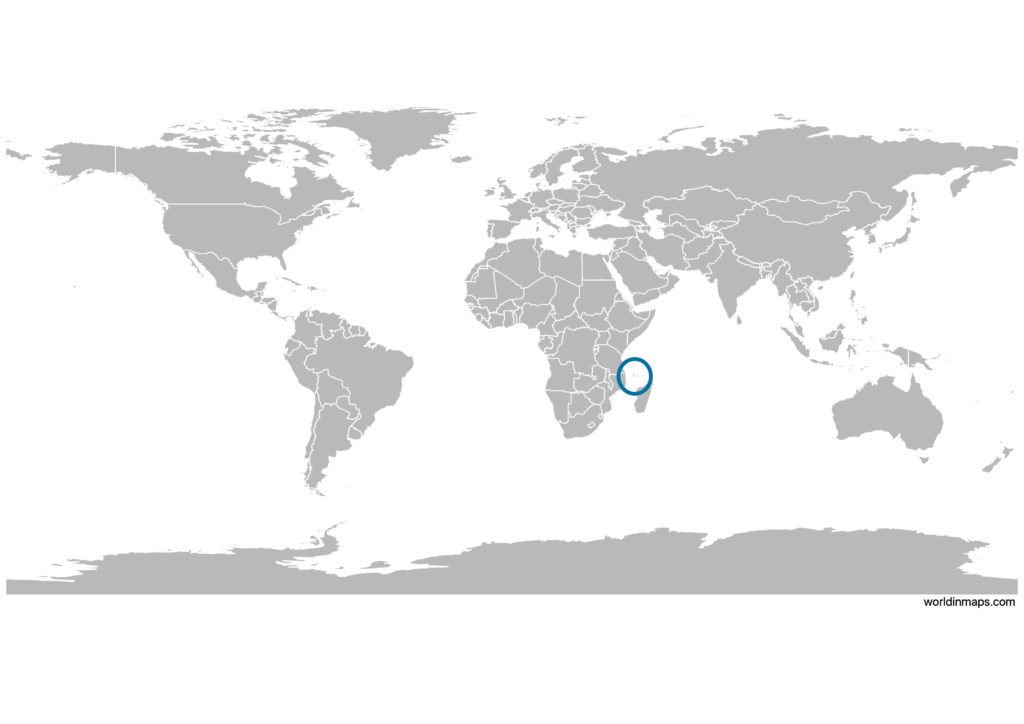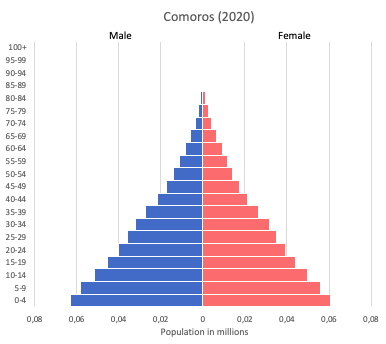Comoros

| Government | |
| Name | Union of the Comoros |
| Ngazidja Comorian | Umoja wa Komori |
| French | Union des Comores |
| Arabic | الاتحاد القمري al-Ittiḥād al-Qumurī/Qamarī |
| Government type | Federal presidential republic |
| Capital | Moroni (42,872) |
| Currency | Comorian franc (KMF) |
| People | |
| Population (2020) | 869,595 (163rd) |
| Density of population | 457 P/km2 (27th) |
| Nationality | Comoran |
| Official languages | |
| Arabic | |
| French | |
| Comorian | |
| Ethnic groups | |
| Afro-Arab | 86% |
| Malagasy | 14% |
| Religions | |
| Sunni Muslim | 98% |
| Other | 2% |
| Life expectancy (2020) | |
| Male | 63.3 years |
| Female | 68.1 years |
| Total population | 65.7 years (191st) |
| Homicides | |
| n.a. | |
| Geography | |
| Land area | 2,235 km2 |
| water area | 0 km2 |
| total area | 2,235 km2 (180th) |
| Lowest point | |
| Indian Ocean | 0 m |
| Highest point | |
| Karthala | 2,360 m |
| Land use (2011) | |
| Agricultural land | 84.4% |
| Arable land | 46.7% |
| Permanent crops | 29.6% |
| Permanent pasture | 8.1% |
| Forest | 1.4% |
| Other | 14.2% |
| Urbanization | |
| Urban population (2020) | 29.4% |
| Rate of urbanization | 2.87% annual rate of change (2015 – 2020) |
| Economy | |
| Labor force (2016) | 278,500 (166th) |
| Labor force by occupation (1996) | |
| Agriculture | 80% |
| Industry and services | 20% |
| Unemployment rate (2014) | 6.5% (96th) |
| GDP (PPP) (estimate 2019) | |
| Total | $2.446 billion (178th) |
| Per capita | $2,799(177th) |
| GDP (nominal) (estimate 2019) | |
| Total | $1.179 billion (182nd) |
| Per capita | $1,349 (165th) |
| GDP by sector (estimate 2017) | |
| Agriculture | 47.7% |
| Industry | 11.8% |
| Services | 40.5% |
| Exports (2017) | $18.9 billion (212nd) |
| Exports partners (2017) | |
| France | 36.5% |
| India | 12.2% |
| Germany | 8.2% |
| Pakistan | 6.3% |
| Switzerland | 5.8% |
| South Korea | 4.7% |
| Russia | 4.3% |
| Imports (2017) | $207.8 billion (209th) |
| Imports partners (2017) | |
| UAE | 32.8% |
| France | 17.3% |
| China | 13.2% |
| Madagascar | 6.1% |
| Pakistan | 4.5% |
| India | 4.3% |
Comoros on the world map

Comoros top 10 largest cities
- Moroni (42,872)
- Moutsamoudou (23,594)
- Fomboni (14,966)
- Domoni (14,509)
- Tsimbeo (12,472)
- Adda-Douéni (10,858)
- Sima (10,374)
- Ouani (10,179)
- Mirontsi (10,168)
- Koni-Djodjo (8,109)
Demography
Population pyramid

Age structure data
Estimate for 2020:
- 0-14 years: 36.68% (male 154,853/female 155,602)
- 15-24 years: 20.75% (male 85,208/female 90,422)
- 25-54 years: 33.99% (male 136,484/female 151,178)
- 55-64 years: 4.49% (male 17,237/female 20,781)
- 65 years and over: 4.08% (male 15,437/female 19,079)
Remark: the age structure of a population affects a nation’s key socioeconomic issues. Countries with young populations (high percentage under age 15) need to invest more in schools, while countries with older populations (high percentage ages 65 and over) need to invest more in the health sector. The age structure can also be used to help predict potential political issues. For example, the rapid growth of a young adult population unable to find employment can lead to unrest.
Population from 1950 to 2020
Source: United Nations, Department of Economic and Social Affairs, Population Division (2019). World Population Prospects 2019, Online Edition. Rev. 1.
Evolution of the life expectancy from 1960 to 2018
Source: World Development Indicators, The World Bank
Economy
Agriculture:
vanilla, cloves, ylang-ylang (perfume essence), coconuts, bananas, cassava (manioc)
Industries:
fishing, tourism, perfume distillation
Exports – commodities:
vanilla, ylang-ylang (perfume essence), cloves
Imports – commodities:
rice and other foodstuffs, consumer goods, petroleum products, cement and construction materials, transport equipment
Time zone and current time in Comoros
Go to our interactive map to get the current time in Comoros